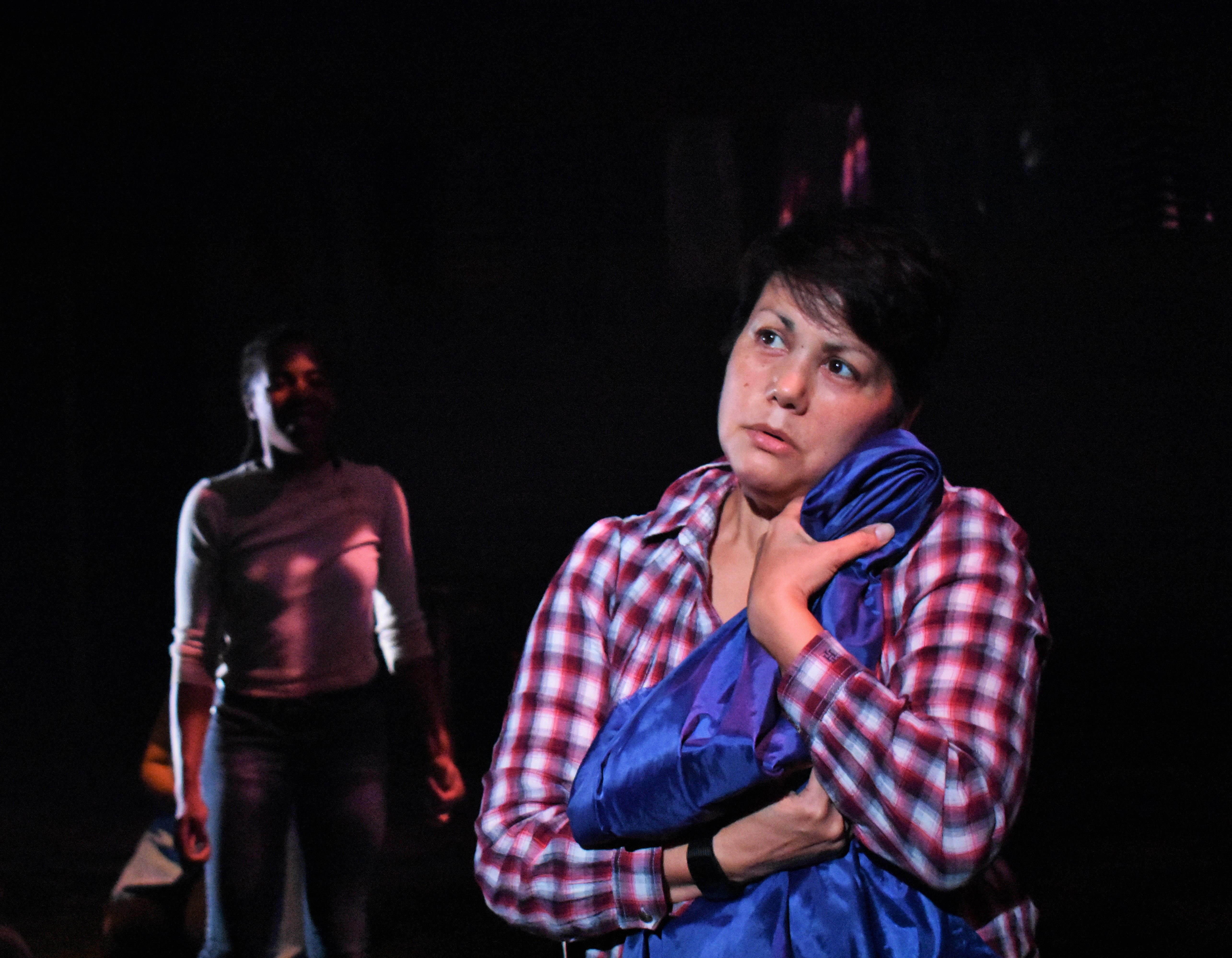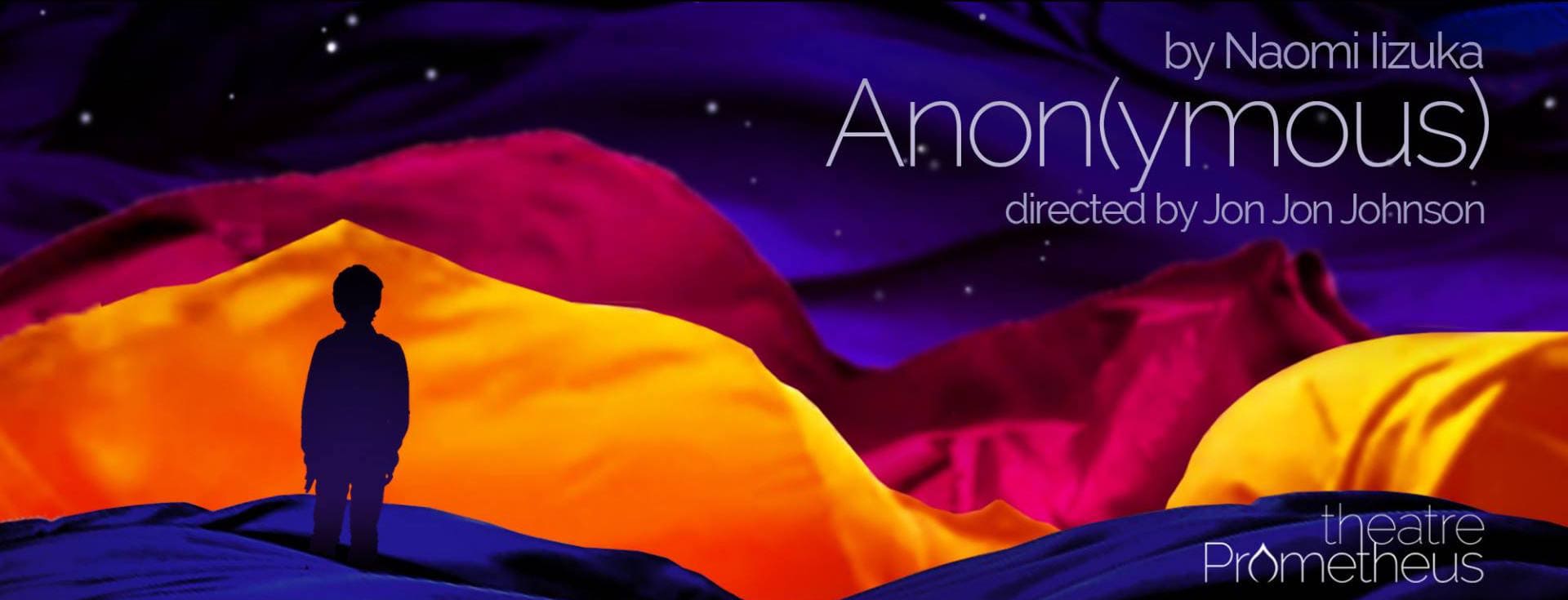Countless migrant children have been separated from home and family in war-torn parts of the world, and there is no way all their stories will be told. But Naomi Iizuka’s Anon(ymous)—just opened in a lyrically dreamlike production directed by Jon Jon Johnson—finds a way to contain those multitudes. Borrowing loosely from The Odyssey, Anon(ymous) traces the parallel narratives of a teenage boy who lost his home and his mother and a mother who lost her home and her son.
Because the play was originally commissioned and produced by the Children’s Theater Company of Minneapolis, its point of view is intriguingly both youthful and mature. The language is eloquently simple; the scenes are dramatically direct; the characters are vivid types. Yet the ruthless sounds of war intrude and there is no mistaking the harsh realities the show evokes.

As the audience arrives, Sound Designer Niusha Nawab broadcasts a BBC radio report about uprooted civilians, people fleeing violence, government offensives, huts burned, cattle killed, UN camps, disease, atrocities, tears. It is a bracing and grim documentary prelude to what turns out to be a more nuanced, more interiorized mise-en-scène. An ensemble of the displaced enters sorrowfully in Lighting Designer Ian Claar’s mottled half-light. One by one they huddle vulnerably under Set Designer Eric McMorris’s colorful assemblage of clothing hung on clotheslines that criss-cross the stage. Wearing rag-tag garb pulled by Costume Designer Robin Weiner, they are expressive of all those who yearn to breathe free.
This chorus of refugees then begins a haunting ode to home. It beautifully establishes the childlike storybook voice of the play:
Where I come from is oxen in rice fields and hills the color of green tea.
Where I come from is jungles filled with jaguars and pythons thick as a grown man’s thigh.
Where I come from is poison frogs the size of a thumbnail and squirrels that can fly from tree to tree.
Where I come from is waterfalls taller than the tallest skyscraper…
We meet the son and the mother: the young Anon (Eirin Stevenson) and the grieving Nemasani (Toni Rae Salmi). And we learn they got separated in the same circumstances. There was a war. They escaped by boat. There was a storm. The boat they were on sank. People drowned and disappeared. Neither Anon nor Nemasani knows the other is alive. But because we now know them both, we can anticipate their longed-for reunion, the hope for which sustains the play’s momentum through the episodes that follow.
And what an ingenious patchwork those episodes are. For instance, there is a scene in a sweatshop where refugee women are sewing clothing, and among them is Nemasani, stitching a shroud for the son she presumes dead. The brutish factory manager Mr. Mackus (Peter Mikhail) comes on to Nemasani and demands she marry him—making her the latest in his succession of mail-order brides. It is a striking instance of how the play can suggest adult-themed storylines in the language of Disneyesque innocence.
And there is a scene that establishes how Anon washed up half-dead on a beach and was rescued by Calista (Madelyn Farris), whose rich father owns the beach and a whole lot more. She insists on kissing him but he refuses—a touch that surely would be relatable by tweens.

In scenes that follow, the character of Anon is shown to be as chameleon-like as Odysseus. He changes his name situationally, sometimes calling himself Nobody. He is adopted by a very wealthy American family—Nice American Father (Aron Spellane), Nice American Mother (Kara Turner), Nice American Daughter (Madelyn Farris)—but they aren’t his family and they aren’t his home and he runs away. He is befriended by Pascal, a refugee from West Africa (Shaquille Stewart), who helps him hide from immigration police in a tunnel. He scrounges for food discarded in garbage bags by an Indian restaurant run by Ali (Mikhail) and Ritu (Tamekia Jackson). Upon seeing its sign saying CURRY, he takes the name Koo Ri.
The stark realities faced by fleeing refugees are imaginatively and intergenerationally summoned in a scene in a truck driven by Strygal (Stewart). Beside him in the front seat are Anon and another young refugee named Belen (Cindy Wang). Strygal creepily puts the make on Belen and she resists. Anon, hearing sounds from the back of the truck of crammed refugees being transported, insists that Strygal pull over. Strygal refuses and Anon grabs the wheel. The truck crashes, followed immediately by another haunting ensemble chorus:
I came to America on a ship.
I came to America in a truck.
I walked a thousand miles.
I crossed a giant desert.
It was so hot I couldn’t breathe.
It was so cold, my fingers froze.
…
I had so many hopes.
I had so many dreams.
But I died
I died
I died along the way.

The play’s goriest scene involves an eyepatch-wearing, wine-swilling butcher, Mr. Zyclo (Spellane), who intends to make sausage out of Anon. Zyclo’s pet bird (Turner) enters comically squawking and stalking about in high heels. In a show of avian allyship worthy of an animated cartoon, she gives one her shoes to Anon to poke out the butcher’s good eye and the other she uses to bludgeon him to death. It’s a gross-out scene sure to have pleased the kids, and a nicely timed respite for grownups from the heavy political reverberations at play.
In true Disney-magic fashion, Iizuka introduces a girl who is a goddess, Naja (Noa Gelb). She is like a brainy BFF to Anon, and a sweet romance blooms between them. They even share a kiss.
ANON: Do all goddesses kiss like that?
NAJA: No, just me.
(Anon and Naja kiss again.)
ANON: I’m really homesick.
NAJA: I know.
ANON: It’s like a big empty room inside of me.
NAJA: I know.
ANON: What if you want to go home, but there’s no more home to go home to? What if the one person you love more than anything, what if they don’t remember you?
Later, when Anon is in peril of being impaled by an angered Mr. Mackus, Naja suddenly appears with a sword and, like Calista before her, saves Anon’s life. So there’s girl power for the kids too.
The morning after I saw Anon(ymous)—in a pleasurable staging of a lovely play that can be appreciated openheartedly with child’s-eye simplicity—I awoke to a headline reading “Splitting families again on table at White House.” It was a shocking reminder that the stories about migrant children told through myth and fantasy in Anon(ymous) do not have magical happy endings in real life. And that BBC preshow broadcast is more like how it goes down.
Running Time: 90 minutes, with no intermission.
Anon(ymous) plays through October 27, 2018, presented by Theatre Prometheus at the Silver Spring Black Box Theatre– 8641 Colesville Road, Silver Spring, MD (next to the AFI Silver Theatre). Tickets are available online.
Cast
Eirin Stevenson: Anon
Noa Gelb: Naja
Peter Mikhail: Mr. Mackus, Ali, Ignacio, Ensemble
Aron Spellane: Senator Laius, Mr. Zyclo, Nice American Father, Ensemble
Kara Turner: Mrs. Laius, Zyclo’s Bird, Nice American Mother, Ensemble
Toni Rae Salmi: Nemasani, Ensemble
Madelyn Farris: Calista, Serza, Sewing Lady #2, Nice American Daughter, Ensemble
Cindy Wang: Nasreen, Belen, Ensemble
Tamekia Jackson: Ritu, Sewing Lady #1, Ensemble
Shaquille Stewart: Pascal, Strygat, Ensemble
Production Crew
Jon Jon Johnson: Director
Genevieve Dornemann: Stage Manager
Eliza Mott: Assistant Stage Manager
Robin Weiner: Costume Designer
Niusha Nawab: Sound Designer
Ian Claar: Lighting Designer
Maddy McKeague: Assistant Lighting Designer
Eric McMorris: Technical Designer and Set Designer





